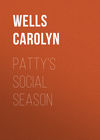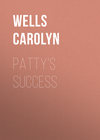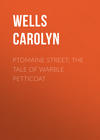Kitabı oku: «The Mystery Girl», sayfa 10
CHAPTER XIV
A PROPOSAL
Maurice Trask took up his reins of government with a firm hand. He left all housekeeping and domestic matters to Mrs. Peyton, but the business affairs of Doctor Waring, he concluded to clean up as rapidly as possible.
“It’s astonishing,” he said to Lockwood, “what a lot of varied interests my cousin had. This morning’s mail brings all sorts of things from Rare Book Catalogues to Mining Prospectuses. By the way, I think I shall have an auction of his rare books. Such things don’t interest me, and I believe they have a big money value.”
“Some of them have,” Lockwood returned, indifferently.
He could not bring himself to like his new employer, but as he had agreed to stay with him for a time, he did his best to meet requirements.
“Take this lot, now,” and Trask indicated a bookcase full of old volumes of the classics. “They mean nothing to me – I can’t read Latin or Greek, and wouldn’t if I could. My good heavens! Look at this one!”
Trask had taken down the volume that had been on Doctor Waring’s desk the night of his death. As he flipped over the pages, two were stuck together, and the ghastly red stains showed only too clearly that they were the spilled blood of the dying man.
“Ugh!” he said, holding out the volume to Lockwood, “burn that up. How could anyone have put it back on the shelf? Never let me see it again!”
The secretary took it, noting that it was a copy of Martial, to which Doctor Waring had been greatly attached. Indeed, it had, to Lockwood’s knowledge, been lying on the Doctor’s desk for a week or more before his death.
Laying the stained volume aside in his own desk, Lockwood proceeded to assist in the examination of the books.
He was not at all surprised to find Trask discarding the ones he would have retained and keeping the most worthless – though there was little that could really be called trash in the Waring library.
“Where are the story books?” the new owner grumbled. “No detective stories? No spicy novels? No joke-books?”
“Doctor Waring was serious-minded,” Lockwood reminded him. “He cared little for lighter reading. He was a scholar.”
“He sure was – to judge from these old dry-as-dust tomes. But, I’ll fire a lot of the poky old stuff, and so make room for more entertaining books. You see, Lockwood, I hope – and I expect to get me a wife before long.”
Gordon’s heart seemed to contract, for he divined what was coming.
“Yeppy, that’s so. Little Old Maurice wants a wifie – and – who do you suppose has caught my fancy?”
“Who?” was the mechanical response.
“Why, none other than the little Miss Mystery. Oh, yes, I know she is under a cloud – but I can get her off – I’m a bird of a lawyer, you know – and we’ll fix up all that. Then, I’ll elevate that little nonentity to the elevated position of the missus of Maurice Trask. Hey, my boy, how’s that?”
Had Lockwood’s calm not been habitual with him, he could scarcely have maintained it through this scene. As it was, he was a boiling, seething furnace inside him, but his judgment told him that any exhibition of surprise or annoyance would only irritate the other man without doing any good.
Moreover, if Trask were really a shrewd lawyer, and if he knew something that would make any trouble for Anita – and she had hinted that he did – then, Lockwood argued, he must keep friendly with Trask, at least until he found out more of the matter.
So he said, lightly, “Has the lady agreed?”
“Well – not yet; but – I say, Lockwood, you’re hit in that same direction, eh?”
“I admire Miss Austin very much, yes.”
“Well – you keep off – do you hear?”
“I hear,” said Lockwood, in his imperturbable way, but when Trask looked up and caught the cold stare of his secretary, he dropped the subject and returned to the books.
Since Doctor Waring’s death, Lockwood had formed the habit of going back to the Adams house for his luncheon. This, of course, in the hope of seeing something of Anita, and also, because his new employer preferred it that way.
At luncheon, Trask took occasion to eulogize Miss Austin.
Helen Peyton stood it as long as she could, and then broke out with: “I don’t see what you can find to admire in that thin, sallow little thing! And, beside, she is a wicked girl. I think she killed Doctor Waring, but even if she didn’t, she came over here to see him, secretly, late at night, and if that isn’t wrong-doing, I don’t know what is! But just because she puts up a helpless bluff, all the men fall for her!”
“Jealous, Miss Peyton?” and Trask looked at her shrewdly.
“No,” Helen tossed her head. “I’ve no reason to be. That girl is nothing to me, and the sooner she gets out of Corinth the better. If the police will let her go!”
“Now then, Miss Peyton,” Trask began, in his most emphatic manner, “and Mrs. Peyton, too, once for all, I will hear no word against Miss Austin in my house. Put any meaning you like into that, but remember it. One word against Anita Austin, and the speaker of it goes out of my door never to return. Am I clear?”
“Clear? Yes; but I can tell you – ”
“Hush, Helen,” said her mother. “We want to stay here, don’t we? Well, then, as Mr. Trask is evidently much in earnest, I insist that you obey his wishes – as I shall.”
“That’s right, Mrs. Peyton. And if your daughter forgets my hints I trust to you to keep her reminded. That’s all about that.”
In this fashion Maurice Trask settled every question that arose. His word was law, and he spoke no unnecessary words.
The servants could obey or leave. The housekeeper had been told the same, and the secretary understood it, too.
Returning to the library after luncheon, Trask sat at the desk in deep thought.
“Got to get the girl,” he told himself. “Plenty to hold over her head – but she’s skittish, that’s plain to be seen. Also, she’s in love with Lockwood. Got to get him out of town. Nothing doing while he’s around. Now, how? Morton hinted of his being deeply in debt. If so, he’s got some past history, guess I can get something on him – got to, whether I can or not. H’m. Wonder if the little girl did do the sticking. Hard to believe it, and yet that kid’s got it in her. She sure has! And she’s a Truesdell all right. Nobody ever had those beetling brows, almost joining above those dark eyes, in that level line – why, if she’s a Truesdell – ! Good Lord, I’ve got to marry her! I’ll have to scare her into it! Now, Maurice, my boy, get in some of your finest work.”
Clapping on his hat, he started for the Adams house.
As luck would have it, he met Anita and his secretary walking toward him.
“Playing truant?” he called out gaily to Lockwood.
“I’m just on my way to your house,” Gordon returned, coldly.
“You too, Miss Mystery?” and Trask gave her a wide smile.
“No; I’m going to the post-office.”
“Ah, I see. Then, on your way, Lockwood – and I’ll step along with Miss Austin.”
There was no good way out of this arrangement, so it obtained, and Trask fell into step with the girl, as Lockwood turned off toward the Waring house.
“Now, my dear young lady,” Trask began, unheeding her look of aversion, “you may as well understand me first as last. I’ve got the whip hand – or, as that isn’t a very graceful expression, let us say, I hold the trumps. I know all about you, you see. I know why you went to the doctor’s library that night, and – I know what happened there.”
“You don’t,” said Anita, coolly. “You’re bluffing, and I know it.”
“No, I’m not bluffing – not entirely, anyway. True, there are some things I don’t know yet, but – I soon will! Don’t think you can keep anything from me! I’m going to take a week for investigation. Also, to give you your chance. If I find out what I fully expect to find out I shall make it all public – how will you like that?”
A great fear showed in Anita’s eyes, and she murmured, brokenly:
“Don’t – oh, Mr. Trask, don’t!”
“Hah! Scared, are you? I thought you’d be! Now, you know my price. You marry me – promise to marry me, that is, and I’ll get you through this thing with bells on. No shadow of suspicion shall remain attached to you – or, to any one you care for.”
“I heard you were not going to rest until you learned who killed Doctor Waring,” Anita temporized.
“Yes, yes; but that was before I saw you. Now, I don’t care if you have killed half the people in Corinth, I want you all the same. You’ve bewitched me. You, a silly little slip of a girl, with no particular claim to beauty, except your big, mournful eyes, and your peach of a mouth! I’ll bring the smiles to that sad little face. Oh, Anita, I’m not a brute, and I do love you so. Give up your foolish fancy for Lockwood, for it is only a passing attraction. And he hasn’t any money, and he’s deeply in debt, and oh, I’m a thousand times a better catch!”
“If you knew how you damaged your cause by talking like that – ” the girl began, her eyes cold with scorn.
“Then I won’t talk like that,” Trask said, humbly. “Only take me, Anita, and you can make me over to suit yourself. I’ll do whatever you say. I’ll read the books you want me to, I’ll get cultured and refined – and all that.”
Anita almost laughed. “You are so funny,” she said.
But this was a little too much for Trask’s self-love.
“Funny, am I?” he stormed. “Funny! You’ll see how funny I am when I tell the police why you killed that man! You’ll see if I’m funny when I refuse the evidence that might help you out. When I keep still instead of speakin’ out in meetin’! You look here, Anita Austin, I hold you in the hollow of my hand, and don’t you forget it! You’ve got a deep dark secret – and though I don’t know quite all of it – I’ll know it soon. What M. Trask sets out to find out, he finds out. See? Now, do you want to tell me who you are – or not? Want to tell me who your father was? Your mother was a Truesdell – I’ll bet on that!”
Miss Mystery’s face fell. Abject despair was written on every line of it. She glanced at Trask, and his own determined expression showed her that she could hope for nothing from him save on his own terms.
And those terms were too hard for her. Just aware of loving Lockwood, just learning to know what love meant and how sweet it could be, just realizing, too, the awfulness of her own position, the dire necessity for secrecy, the terrible result of Trask’s revelations, should they be made, altogether Miss Mystery faced a dangerous crisis.
“You say you’ll give me a week?” she said, at last, grasping at a hope of reprieve.
Trask looked at her with curiosity.
“What good’ll that do you? Better put yourself under my protection at once. Every day you lose is that much nearer discovery.”
“All right, I’ll dare it! They won’t – won’t condemn me, anyhow.”
“Ho, ho. Banking on your sex to save you! Well, honestly, I don’t really think they’d send a pretty girl like you to the chair, but a trial would convict you in the eyes of the world, even if twelve men were too soft-hearted to see you electrocuted. And there’d be imprisonment – ”
“Oh, hush! Mr. Trask, have you no pity?”
“Plenty for the girl that is to be my wife. None for any other. And especially none for a girl who scorns me and throws me over for my own secretary. I’m a red-blooded man, I am, and you can’t play fast and loose with me and get away with it!”
“I don’t mean to play fast and loose with you, if by that you mean changing my mind. But, I do ask for a few days to think it over. That’s not unreasonable, is it?”
Miss Mystery’s little smile was cajoling, and Trask couldn’t resist it.
“All right,” he said, as he looked hungrily at her bewitching face, “take a coupla days, then. But, only on condition that you don’t let Lockwood make love to you. Promise me that for the forty-eight hours, you won’t see that man alone.”
“How can I promise that?”
“You’ll have to, whether you can or not.”
“All right, I promise.”
He looked at her sternly.
“And you’ll keep that promise, or you’ll be sorry! I haven’t much opinion of your promises, you’re not the sort to keep faith. But, remember I’m a power. Maurice Trask can do whatever he sets out to do. And if you forget that, you’re mighty apt to regret it.”
“I gave you a promise,” Anita said, looking at him coldly, “and I fully intend to keep it. It’s not such a very hard one to keep.”
Her lip curled, and though he guessed the tumult in her heart, there was no sign of it on her face.
Trask accompanied her to the postoffice, and then, bidding him a careless good afternoon, Anita went into a large drygoods shop and he made no attempt to follow her.
He would have been interested, however, had he noted her proceedings. For she went straight to a telephone booth, and called up the Waring house. Ito answered and when she asked to be connected with Mr. Lockwood, the butler gave the connection without question.
“Gordon?” came the soft little voice. “This is Anita.”
And then she told him quickly but fully all that had passed between her and Trask.
“So you see,” she concluded, “I do want these two days to think things out, and I mustn’t see you alone, for he’s sure to know of it.”
“All right,” Lockwood said, “We’ll do our courting over the telephone. Let me see, I’ll go down town this evening and telephone you – ”
“No, that won’t do. I can’t talk to you in the Adams front hall! Here’s a better plan. Tomorrow, when Mr. Trask goes out, you call me up there, and I’ll go out to a pay station and call you up where you are now. And the day after tomorrow the time will be up.”
“Yes, and what are you going to do then?”
“I don’t know,” said the girl, her voice suddenly losing its brightness. “I’m going to think it out. Good-by.”
“Oh, wait a minute. I’ll see you at dinner, shan’t I?”
“Oh, yes; and this evening, I suppose, but only with others present.”
And after a few more words Anita left the booth and walked slowly home.
When Trask returned to his library he said to Lockwood, “Get busy on those old books at once, will you? I want the shelves cleared for some of my own books that I’ve sent for.”
“Very well,” returned the secretary, thinking of the probable difference between the expected books and those they would replace.
“Do you mind, Mr Trask, if I take a few of these old ones myself? I’ll pay you whatever price a first class dealer sets on them.”
“Oh, take what you want, without pay. I’m in a good humor today, Lockwood, better take advantage of it. Help yourself from the shelves.”
“Thank you, I’ll not impose on your kindness and generosity.”
Nor did he, but among the few volumes he chose was the crimson stained copy of Martial’s Epigrams.
Distasteful though it was, Lockwood looked at the book with a feeling of reverence and opened the volume at the page that had last held the interest of its owner’s scholarly mind.
The crimson stain completely obscured the print, but Lockwood gazed long at the defaced page.
“I wonder,” he said to himself, “if a crack detective could get anything from this. There’s that Stone, Mercer is always raving over – I suppose he’s terribly expensive – yet this strange case might intrigue him – and yet – there’s Anita to be considered. If it should turn the tide against her – ”
Later that afternoon, Trask went out again and Lockwood seized his chance.
Calling Anita at the Adams house, he said, “Listen, dear, you needn’t say anything but yes or no, and then no one will understand.”
“All right,” came the reply.
“I’ve just about come to the conclusion I’ll get a clever detective and put him on the case. I mean a real detective – in fact, Fleming Stone.”
“Oh, no!” Anita’s voice was one of utter dismay.
“Why not?”
“I – I can’t tell you this way! You said – ”
“So I did. Well, here, I’ll ask questions. Don’t you want me to do this?”
“No!” very emphatically.
“You’d rather I wouldn’t?”
“Very much rather.”
“Because you fear ill effects to yourself?”
“Yes.”
“You are sure you’re not overestimating the danger of that?”
“I am sure.”
“Then there’s no more to be said. Good-by.”
Lockwood hung up the receiver, and turned around to see Trask frowning at him.
“So that’s the way you and Miss Austin whip the devil around the stump!”
“That’s the way,” returned Lockwood, coolly.
“She promised not to see you alone – is this how she keeps the letter of her promise and breaks it in spirit?”
“Leave her out of this. I called her up, she did not call me.”
“All the same. Now, I gather from the interesting talk I overheard that Miss Austin does not wish to have Fleming Stone take up this case.”
“You are at liberty to gather anything you choose.”
“See here, Lockwood, you make a mistake when you try to antagonize me. I’d be a better friend to you than an enemy.”
“I’ve no reason to want you for either.” Lockwood was by no means impertinent, he merely spoke indifferently. Trask noted this, and went on, more suavely:
“Now, my dear Lockwood, what I propose to do now, is to employ Fleming Stone myself.”
Lockwood was astounded. At first he was glad, for he felt sure Stone could solve the whole mystery. But, then, suppose it incriminated Anita, and though Lockwood was sure of her innocence, he was just enough so to realize that his surety was largely because of his affection for her. Suppose Stone should prove her to be the criminal!
It couldn’t be – and yet —
He looked up to find Trask smiling broadly.
“You’ve the reputation of being of an impassive countenance, Lockwood, but to me your face is as an open book! However, it’s only because you are up against a difficult problem. You want Stone to come, yet you’re afraid he’ll find out that Miss Austin is pretty deep in this murder mystery. But I’ve made up my mind, and I think you’ll see that any attempt on your part to change my decision would look bad for Miss Austin.”
“You let her name alone, Trask, or I’ll reason with you myself.”
“Have you any real right to tell me to leave her name alone?”
“Yes, I have.”
“Are you and she engaged?”
“So far as I am concerned, we are. Miss Austin prefers to wait until later to announce it, but I can answer for her to you in confidence.”
“Oh, it’s in confidence, all right. Don’t fear I’ll breathe the news. For, you see, I’ve made up my mind to marry Anita Austin myself; and if Fleming Stone proves that she is a murderess, I’ll marry her all the same. She’ll escape punishment – what woman doesn’t?”
“Then, look here,” Lockwood’s manner changed. “If you’re going to get Stone anyway, why can’t we work with each other and not at odds? Whatever else we think or feel we both want to save Miss Austin all the trouble or distress we can. Let’s be friends, then, and talk things over with Stone, and then – ”
“I’m on! Then if we see things are going against her, shut him off!”
“Well, yes, if we can.”
“Of course we can. I’ve money enough for anything – even to buy off Fleming Stone. No man’s too big to be bought.”
“I don’t mean all this exactly as you do, but I do mean this: if Stone can solve the mystery and clear Anita, let him do it. If he finds her implicated, let it be understood by him beforehand, he is to cease investigations.”
Trask thought a minute.
“That goes,” he said; “I agree.”
CHAPTER XV
FLEMING STONE COMES
“Terence.”
“Yes, sir.”
“We’re off for New England.”
“New England it is.”
“Start this afternoon, stay a few days, maybe a week among the classic shades of Corinth.”
“Corinth it is.”
This somewhat laconic conversation was all that was necessary for Fleming Stone’s assistant and general factotum to make preparations for the trip, achieve tickets, and arrive, with his chief, at the train gate at the proper time.
Terence McGuire, sometimes called Fibsy, because of a certain tendency to mendacity, had begun as Stone’s office boy, and, by virtue of his general aptitude for detective work and his utter devotion to Stone, had become a worthwhile and much appreciated assistant. Not only did the lad look after all details of their trips as well as taking care of the offices, but many times his ingenious mind so stimulated or aided Stone’s own, that more often than not they were practically colleagues.
They had a compartment to themselves at the end of the car, and they were no sooner started than Stone began to discuss the case with the boy.
“I don’t know all the details, of course,” he began, “but it’s a setting after my own heart.”
“Then I can guess it,” put in the wise Fibsy. “Man found dead in sealed room.”
“You’re a wizard! What made you think of that?”
“’Cause that’s the problem you like best, F. Stone. Wise me up some more.”
“It’s further interesting, because the victim is a great and good man, in fact, the President-elect of the University of Corinth.”
“My! Somebody didn’t want him for president? That the idea?”
“Apparently not. Nothing in the letter about that.”
“Who wrote the letter?”
“The relative who inherits the whole estate.”
“He do the job?”
“No reason as yet to think so. But the criminal mustn’t be guessed at. The point is, the locked room.”
“How was the killing done?”
“Stabbed. No weapon found and no way to get in or out of the locked room. Fine problem.”
“Yes – if we don’t find a secret stairway – or, a lying servant. Such cases generally fizzle out that way.”
“Fibs, you’re a Boy Cassandra.”
“What’s that?”
Stone explained, for it was his habit to supplement McGuire’s very scant education by bits of information now and then, when time served.
“But, there’s a queer clause in the arrangement,” Stone went on, “if we find the evidence leading in a certain direction, the chase is to cease.”
“That won’t do.”
“Of course not, and I’ll soon make that clear. But I can’t think it will lead in the given direction as that implicates a young girl, and rarely indeed, have I found a criminal answering to that description.”
“’Tisn’t usual – but, you know, F. Stone, since the war, girls are so independent and so cocky that there’s no telling what they’ll do. Me for the girl – as a suspect.”
“Fibsy, you’re a fool.”
“No, sir. I don’t admit it. See here, sir, if they’re so ’fraid s’picion will turn to that girl, there’s reason for it. Yet, as you can guess, if she didn’t do it, they want her skirts entirely cleared.”
“Pretty good deduction so far. But we can’t judge rationally until we know the facts.”
The facts were told them, when, some hours later, they sat, alone with Maurice Trask in the room where John Waring breathed his last.
“I’m a plain man,” Trask said, for he didn’t care to pose unduly before an astute detective. “I’ve come into this estate of my cousin’s – my second cousin, he was, and I started out with a firm determination to find the villain who killed him. But, there is some cause for suspicion of the young lady I expect to marry. And here’s the situation. If you can solve the mystery of Doctor Waring’s death, and free that girl from any taint of blame, go ahead. But if your investigation leads to her – stop it. I want to marry her just the same, whether she killed anybody or not. But if she didn’t do it, I want to know it.”
“Can’t you learn the truth from the young lady herself – if she is your fiancee?” asked Stone.
“Oh, she says she didn’t do it, of course. But there’s such an overwhelming mass of evidence – or, apparent evidence against her, that it’s the deepest sort of a mystery.”
“Main facts first. Where was the body found?”
“In that desk chair, seated at his desk, as he often was evenings. Reading in a Latin book, so you see, he wasn’t looking for trouble.”
“Found dead in the morning? Been dead all night?”
“Yes, to both those questions. And locked in his room. Had to break in.”
“And no weapon about?”
“Not a sign of any – ”
“Then that cuts out all suicide idea.”
“It does and it doesn’t. You may as well say the locked up room cuts out all idea of a murder.”
“But it must be one or the other. And isn’t it more plausible to look for some way that the murderer could have gone away and left the room locked, than to think up a way that the suicide could have disposed of this weapon?”
“Yes, that’s so, but I want you to investigate both possibilities. You see, if you could prove a suicide, that would free Miss Austin at once. And – if things go against her – I want you to – oh, hang it, it’s hard to put into words – ”
“I’ll do that,” said Fibsy, “if things go against Miss Austin, you want Mr. Stone to frame up suicide, and declare it the truth.”
“Exactly that,” and Trask looked relieved at the thought all his cards were on the table. “I don’t want Miss Austin suspected, but I do want to know if she’s innocent.”
“Any other suspects?” asked Stone.
“Not definite ones. There’s the Japanese who absconded that same night, and of course, there’s the secretary, Gordon Lockwood. I’d like to suspect him, all right, and he has a round silver penholder that just fits the wound that killed Waring. But it doesn’t look like he did it, he never would have left the penholder in evidence, and he would have arranged matters to look more like a suicide. Then, too, how could he lock the door behind him?”
“That question must be answered first of all,” said Stone. “I’ll examine the room, of course, but after the local police and detectives have done that, I doubt if I find anything enlightening. So far as I can see, this whole affair is unique, and I think we will find some surprising evidence and soon. Tell me more of this Miss Austin. Who is she?”
“Nobody knows. In fact, they call her Miss Mystery, because so little is known of her. She appeared here in Corinth from nowhere. She knew no one, and as she began to make acquaintances somebody brought her over here. She met Doctor Waring, and inside of twenty-four hours had so bewitched him that it would seem he had her visiting him in his study late at night. She said at first, she wasn’t here, but as she left the impress of her dress trimmings on that chair-back, and as she has a ruby pin and a lot of money that were in the Doctor’s possession, it looks, one might say, a bit queer.”
“Weren’t the valuables planted on her?” put in Fibsy.
“That’s what she says – or rather, that’s one of the things she said. The girl contradicts herself continually. She says one thing one day and another the next.”
“Is she pretty?” This from Fibsy.
“Pretty as the devil! And that’s not so bad as a description. She has great big dark eyes, with straight black brows that almost meet. She has a jaunty little face, that can be roguish or scornful or merry or pathetic as the little rascal chooses. She has completely bowled me over, and I’d be glad to have her on any terms and whatever her past history. But, there it is. If she has a clean slate in this murder business, I want to know it.”
“And if she hasn’t?”
“Then I don’t want anybody else to know it. If you find, Mr. Stone, real evidence that Anita Austin killed John Waring, or if she confesses to the deed, then you whip around and prove a suicide, and I’ll double your charge. You needn’t do anything wrong, you know. Just sum up that all indications point to a suicide, and let it go at that. Nobody will arrest Miss Austin if you say that.”
“You must be crazy, Mr. Trask,” returned Stone, coldly. “I don’t conduct my business on any such principles as those. I can’t perjure myself to save your lady love from a just condemnation.”
“You haven’t seen her yet.” Trask nodded his sagacious head. “Wait till you do.”
“Give me all the points against her,” the detective suggested.
“I will. I’d rather you knew them from me. Not that I’ll color them – they’re facts that speak for themselves, but other people might exaggerate them. Well, to begin with, this girl, a day or so after she arrived here was seen kissing the picture of Doctor Waring which she had cut from a newspaper. I tell you this, ’cause you’ll hear it anyway, and the gossips think it shows a previous acquaintance between the two. But I hold that as girls have matinee idols and Movie heroes, this girl might easily have adored the scholarly man, though she had never seen him.”
“It is possible,” Stone agreed, “but not very probable. She denies they were acquainted?”
“Yes. Vows she never saw him until one night she went to his lecture, soon after her arrival here.”
“What is she in Corinth for?”
“To sketch – she’s an artist.”
“Go on.”
“Well, as I said, she must have come here that Sunday night, for one of the boarders at the house she lives in saw her cross the snowy field. Also, the footprints just fitted her shoes. Also, the tracks led right up on the side porch here to that long French window. And led right back again to the Adams house.”
“Whew!” Fibsy exploded, “aren’t you rubbing it in?”
“Well, that’s what they tell me – ” Trask asserted, doggedly, “and I want you to know it all, Mr. Stone, before the other people tell you a garbled version.”
“Go on.”
“Then, they say, the girl left marks of her dress trimming on that chair, and Lockwood, the secretary, rubbed them off next morning, as soon as the body was discovered. We have the word of two witnesses for this episode.”
“Who are the witnesses?”
“Ito, the Japanese butler, and Miss Peyton, who lives in this house.”
“Go on.”
“Well, then, ever since the tragedy, Miss Austin has acted queer. Queer in all sorts of ways. She is sad and desolate one minute, and saucy and independent the next. I can’t make her out at all. And she is more than half in love with this Lockwood. I have to cut him out, you see. And I figure, if you prove the case against Miss Austin, and if I agree to marry her and hush up the whole matter, and make it seem a suicide – ”
“You figure that she’ll throw over the secretary for you,” cried Fibsy, his eyes aghast at the man’s plan.
“Exactly that. You see, Mr. Stone, I don’t try to deceive you. While I have a natural sorrow at my cousin’s death, yet remember that I never knew him in life, and that, while I want to avenge his death in any case but one, I do not want to if it implicates Anita Austin.”
“I understand,” said Stone, seemingly not so shocked at the conversation as his assistant was.
“There’s another queer thing,” said Trask. “They tell me that when the body was found there was the impress of a ring on the forehead.”
“A seal ring?”
“Oh, no. Not a finger ring, but a circle, about two inches across, a red mark, as if it had been made as a sign or symbol of some sort.”










